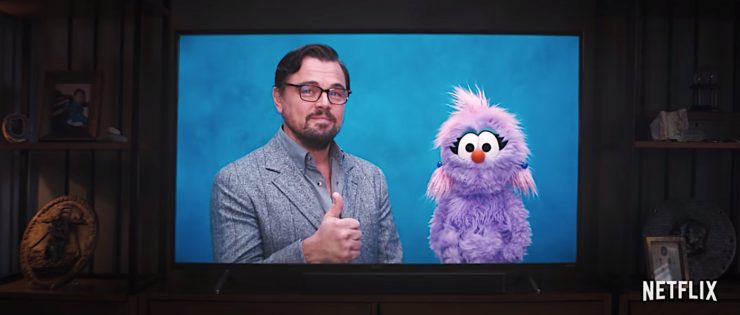Before I say another word: if you found Don’t Look Up moving, terrifying, or if it has inspired you to do anything you can to help fight climate collapse, or to help stem the rising COVID numbers, or to look at social media with a larger grain of salt, then excellent. Please take that energy into 2022, we all need you. (I need you. I need to do more. I’ve just spent the last couple weeks mainlining Beatles documentaries and watching Andrew Garfield’s Tick Tick Boom! press tour—I’m in a MOOD.)
As I type this, on a fine spring day in January, I don’t think the movie is “exaggerated” or “simplistic,” and I think there was a ton of good stuff in the film, both in terms of comedy and appropriate alarmism. What frustrated me was the way the movie got to its points. I’m going to try to unpack a few thoughts below, and along the way I’ll recommend another movie that unspools on parallel lines to Don’t Look Up, but does a few things better.
[Spoilers ahead.]
The plot: PhD candidate Kate Dibiasky (Jennifer Lawrence) finds a comet, celebrations ensue! Until her professor, Dr. Mindy (Leo DiCaprio), realizes that the comet is on a collision course with wackiness Earth. This sets the two academics, and Dr. Oglethorpe of the Planetary Defense Coordination Office, on a collision course with the U.S.’s terrible presidential administration, led by President Janie Orlean (Meryl Streep) and her Chief of Staff/son Jason (Jonah Hill). A tech billionaire Peter Isherwell, who runs an Apple-esque company called BASH, convinces her to let him deal with the comet, because he thinks he can guide it safely to Earth and then mine the shit out of it. Meanwhile THE MEDIA race back and forth like lovers in the Second Circle of Dante’s Inferno, chasing whatever trend gets them the most ratings. Yes, there are comet deniers, yes, they wear hats, yes, “Don’t Look Up” becomes a political slogan, yes, the academics try to fight with their own slogan, “Just Look Up” which doesn’t work very well, yes pop stars get involved.
I’ve spent enough time with academics that I know the parody of a pair of academics trying to explain things to laypeople and suffering through media training is 100% correct.
Although, also:
https://twitter.com/profmusgrave/status/1477099968037011456
I’ve spent enough time with fintech bros and crypto bros and ape-loving bros and a lot of other bros to know that Jonah Hill’s character is, if anything, a subtle portrait of the bros who will ensure our destruction whilst outliving us all.
And I am The Media, albeit a small, niche corner of it, and, well. Neither Marvel nor Disney nor DC has ever paid me or any of my beloved colleagues to give them good reviews. (I fucking wish.) No one has ever told me to change a Rotten Tomatoes score (and come to think of it, I need to update my RT page, holy crap) or bullied me in any way other than the occasional weird comment. I get paid for my job, and it is actually a job, it takes work and time and thought. BUT I also get to work from home in safety. BUT I also try to always put more into my essays and reviews than just the rote amount I’m being paid for, because I believe in the job. I believe that without a healthy culture of critique and debate and discussion and serious thought we end up with a culture that isn’t worth discussion or thought. (This doesn’t mean you can’t enjoy stuff I don’t like, or vice versa. I really loved Under the Silver Lake. I really hate My Best Friend’s Wedding. As always, ymmv.)
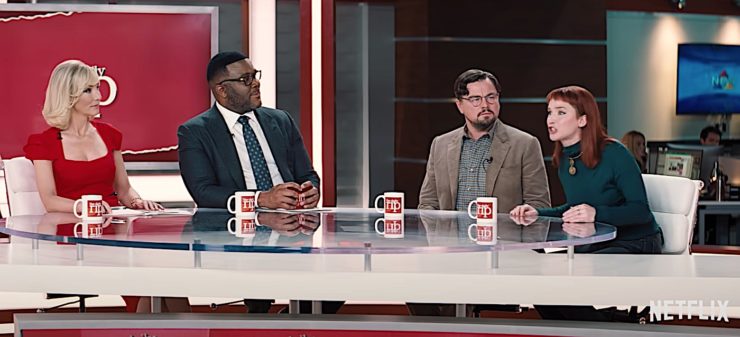
Having said all of that I simply think that there was a better way to do Don’t Look Up, and I wish it had taken that way. There is some really great stuff in this movie, but also a lot of, just, mush? At a certain point it becomes a s’more with too much marshmallow, and you’re just desperately trying to unstick your teeth enough to keep chewing. Bob Dylan’s grandmother once told him that he should be kind, “because everyone you’ll ever meet is fighting a hard battle” and I’ve found that to be true. That’s one of the things that came to mind watching the movie, why I both liked it and was annoyed by it: The people who have spent their holiday break—if they’re lucky enough to get a holiday break in our capitalist hellscape—watching this movie are not the ones who need it. The on-the-ground people like me, we separate our recycling and try to conserve water and sign online petitions and chuck money we don’t have at funds, and it’s all a drop in the bucket to any of the billionaires who could actually help, but are instead poisoning the planet by launching rockets into space ’cause they want to escape.
We all know this.
So we watch the movie and yell on Twitter and some critics shit on the movie for being clunky when, honestly, I don’t think it is, and some critics say it’s “obvious,” which, yes, but again literally anything will be “obvious” after the last few years. But at least it’s something? Making a movie about it is something. And when I’m watching the movie and look down at my phone to see people arguing about whether NFTs are actually worth anything and whether art has any intrinsic value and oh, yeah, maybe some more of the treasonous bastards who permanently ruined my fucking birthday last January will see justice, as a treat, and it’s all just one big scroll while I watch this movie… isn’t it something, at least to point at the absurdity and say, look, there’s absurdity!
But then I thought more about what it could have been, which brings me to the two aspects I want to talk about.
(deep sigh) …yeah, I’m gonna talk about religion again. For a minute, then I’ll move on.
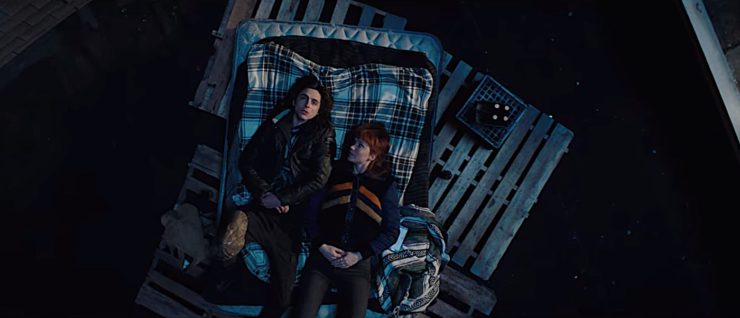
After Kate has a meltdown on TV, she’s shunned by respectable society and takes solace in a friendship with a group of grubby, shoplifting teens led by Yule (Timothee Chalamet). After a brief turn to the dark side in which Dr. Mindy is seduced, metaphorically by a compromise with the tech billionaires and literally by talk show host, Brie Evantee (Cate Blanchett), he also has a meltdown and decides to go back to his roots in the last days before impact. He picks Kate and Yule up, Yule proposes during the drive, and Kate accepts. Dr. Mindy reconciles with his wife. There is hugging and music and cooking. Suddenly they’re joined by Dr. Oglethorpe (???) who just lets himself into their house, and the group gathers around the dining table to eat and seem to break into an impromptu Thanksgiving ritual as they take turns saying what they’re grateful for. Dr. Mindy responds to this with: “We’re not the most religious here in the Mindy household, but should we say amen?” He looks over at his wife, who replies, “Don’t look at me, I don’t know… just say amen?” (I found myself thinking of the scene in Gravity when Sandra Bullock’s astronaut has a meltdown because she doesn’t know how to pray.) At which point Yule says, “I got this” and leads the group in a non-denominational-but-actually-pretty-Evangelical-adjacent prayer.
Dr. Oglethorpe responds to this by saying, and this is verbatim: “Wow, you’s gots some church game!”—which I will not comment upon further.
On the one hand, it’s kind of hilarious to see a group of respectable adults realize they’re at a loss, spiritually, only to be rescued by a be-mulleted skatepunk. But under that surface level, what bothers me is that writer-director Adam McKay occasionally interrupts the main plot threads of the film with brief montages of the life on Earth that’s about to be destroyed: wild animals fighting or fucking, parents bathing their babies, bees pollinating flowers, people gathered in a Buddhist temple, people gathered in a cathedral. One longer interlude, shot from behind, features an Indigenous American dancing and chanting on a mountaintop as the debris from the comet fall around him. These montages are meant to add up to a more street-level view of what ordinary people are doing as the comet screams toward them. The flurry of montages is meant, I think, as a contrast with the three main groups we follow in the movie: President Orlean and Peter Isherwell, The Media, and Dr. Mindy’s group.
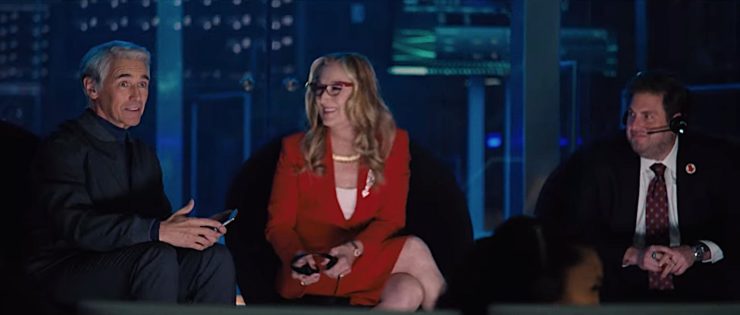
The President and her favorite CEO are fleeing Earth on a predictably penile BASH rocket. When we cut to New York to check in with The Media we see TV techs running out of their stations in a panic, overhead shots of an orgy at a restaurant, and panic and screaming in the streets. The hosts of the Daily RIP muse on their options in an otherwise empty bar, with Jack Bremmer (Tyler Perry) asking, “We can fuck… or… pray?” only for Brie Evantee to reply with “I’d rather just drink and talk shit about people.”
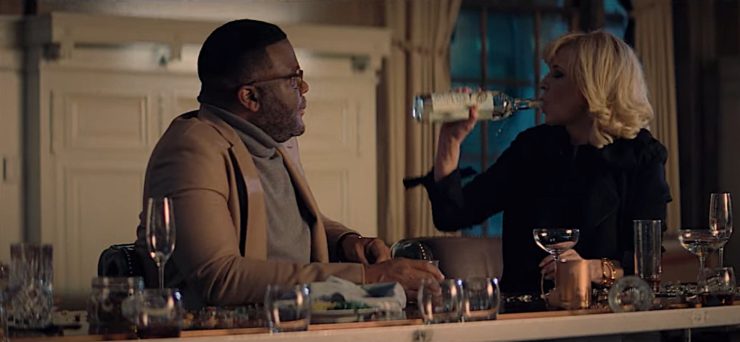
Visually, the different responses to the end couldn’t be clearer: the BASH launch headquarters and escape rocket are all cool, glowing blue, the orgy is literally bathed in hellish red light, the empty bar is all minimalist cream and beige. These scenes of panic and cynicism are intercut with the warm golds and browns of the Mindy family dining room, where a group of adults talk quietly about gratitude. The only people we see reacting to the end of the world in a measured, dignified way are a group of U.S. scientists, and one scientist’s secular family, being led in an overtly theistic prayer by an evangelical punk.
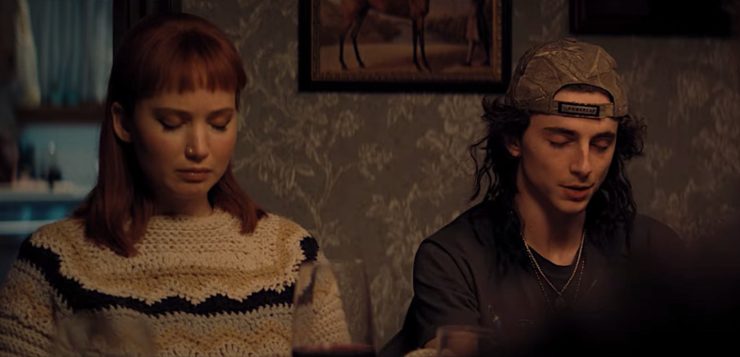
I’m not saying that scientists wouldn’t do this, or that it’s bad in any way. (I also want to be clear that Yule was my favorite character, and I loved Chalamet’s take on him. He’s a great representation of the type of dirtbag evangelical I spent many an hour in deep and profound conversation with, in various parking lots across Florida.) It just makes me… nervous? That after all the over-the-top humor we end in the U.S. Midwest, a family restored, a young straight couple engaged, a group that is 50% scientist embracing a vague Christian-ish practice as their last act on Earth. That after flashing a few context-free wideshots of different spiritual practices, and showing us tech billionaires and political elites trying to run away from the problem they caused, and “media elites” drinking and screwing, the film gives the last word, religiously and morally speaking, to fuzzy theism. And the other responses to the end of the world were so mushy that, again, it’s that too-much-marshmallow-in-the-s’more thing. The film as a whole is so broad and sweeping that this vagueness didn’t surprise me. It even works well (I think) as long as the film sticks to skewering a venal political administration that is happy to radicalize its base by turning them against intellectuals, elites, and The Media even as they know certain doom is raining from the sky. But when a movie turns into “Oops, all Hyperobjects!” it kind of undercuts the very point it’s trying to make.
Which made me think of a movie that achieves part of Don’t Look Up’s intent: Seeking a Friend for the End of the World.
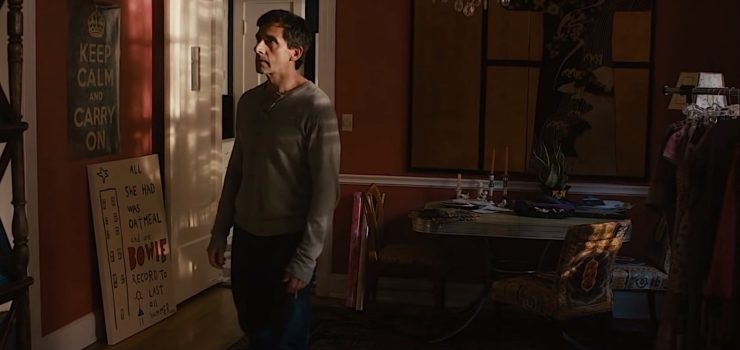
While Don’t Look Up is an allegory in which the planet-destroying comet is standing in for climate collapse, and maybe more broadly, a culture that has been so warped by social media narrative and pop culture that it can no longer agree on what facts are, in Seeking a Friend, the planet-destroying comet is a planet-destroying comet that might also be standing in for the concept of death itself. The films have different projects: Adam McKay very openly wants to make people think about climate collapse, while Lorene Scafaria was trying to create an emotional experience to process grief. But Scafaria gives us a much more street-level view of apocalypse which I think would have served Don’t Look Up way better.
In Seeking a Friend, the plot revolves around an insurance salesman named Dodge, and a twenty-something music fan named Penny. We learn, along with Dodge, that the world is going to end in three weeks because the attempts to deflect an asteroid have failed. He makes a deal with Penny that if she helps him reunite with his long-lost high school girlfriend, he’ll take her to a man who can fly her home to her family in England. With goals set and a clock ticking, the film becomes a picaresque journey through different reactions to the end of the world. There are rioters, there are survivalists in bunkers, people who spend their last days in ecstasy-fueled orgies, people who get up and go to work every day like nothing’s wrong, and people who line up on the beach to have a mass baptism in the ocean. No one goes to Washington D.C. There are no last-minute meetings in the Oval Office. We never meet the people who identified the asteroid, let alone the president, because the film concerns itself wholly with regular, street-level people who are coping with a hyperobject. Most crucially to me, none of the responses are presented as better than any of the others.

Here’s what I mean: in the opening two minutes of Seeking a Friend, we meet Dodge and his wife. They’re sitting in their car, listening to a radio report that an attempt to destroy an asteroid called “Matilda” has failed, and that it will collide with Earth in exactly three weeks, “and we’ll be bringing you up to minute coverage of our countdown to the end of days….along with alllll your classic rock favorites. This is 107.2.” As the Beach Boys’ “Wouldn’t it be Nice” kicks in, Dodge murmurs that they missed their exit. He’s clearly in shock, but his wife looks at him in disgust, jumps out of the car, and runs away. In the next scene we see a billboard covered with personal ads and desperate messages. One note with the message “hire an assassin” is missing a few phone number tabs—clearly a few people have decided they want to kill, or be killed, before everyone dies together. And ad for “fuck a virgin” has already been stripped of its phone numbers, but when the camera lands on the last ad, “seeking a friend for the end of the world,” we see that all the tabs are still there.
In two scenes the movie has given us a timeline, the absurdity of The Media trying to navigate an apocalypse, the knowledge that our hero is facing the end alone, and set the tone of how people are responding to catastrophe. And while the movie doesn’t always meet this level of precision, it’s always, I don’t know, lovable? Here, actually, have an excellent video essay on the film’s gentle existentialism.
The riots aren’t experienced as a top down, news helicopter view—instead, Dodge and Penny are caught up in the riots, and have to escape them. Even better, the idea that all bets are off is explored in two different scenes that are grounded in personality and detail. First, Dodge attends a dinner party with friends that quickly devolves into debauchery. Most of the attendees are in their 40s-50s, and as kids run around wearing Halloween costumes and waving sparklers, the adults make out with each other and dance to INXS and Wang Chung—presumably the stuff they listened to in high school. At one point the extremely Wine Mom hostess stops the party with a chirpy announcement: “You guys, look! Sarah and Dave brought heroin!”
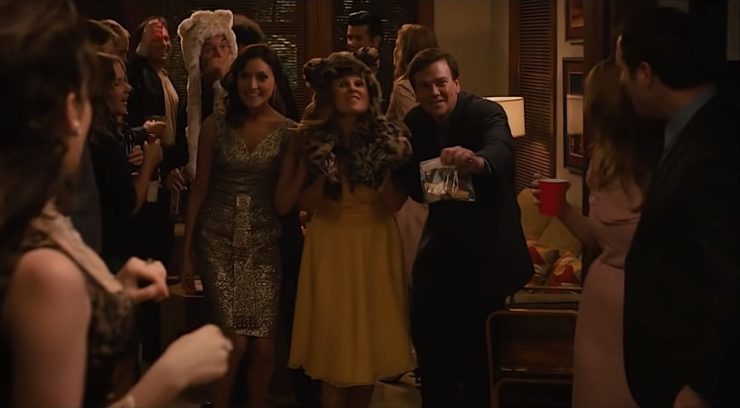
In the second instance, Dodge and Penny stop at Friendsy’s, a TGI Fridays-style establishment. It’s open because the staff realized that they had kind of become each others’ family, and now they’re spending the Last Days in a haze of weed and ecstasy, dancing, petting customers’ hair, and passing out free Mudslides and hamburgers with doughnuts for buns. When Penny tells them its Dodge’s birthday the whole staff comes out to sing to him in the familiar American mid-level restaurant tradition… but that, too, soon devolves—or evolves?—into the beginnings of an orgy.
But my point is, it’s a specific orgy, not just “an orgy”—I’ve worked with several of the characters at that restaurant, and I have purchased Mudslides from them.
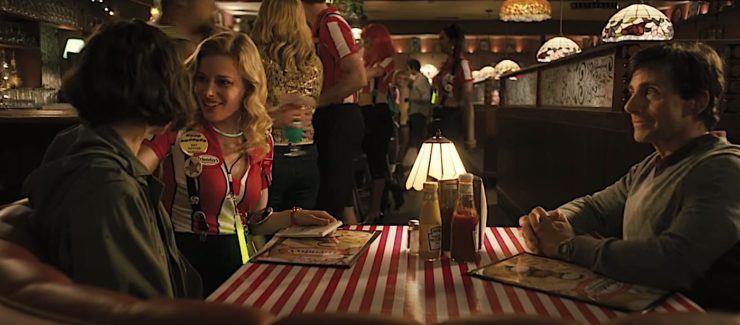
The ending of the film, which I shall not spoil here, fucking destroyed me because it gave me one of the most emotionally honest, vulnerable scenes I’ve ever seen on film. I kept thinking about it during Don’t Look Up. While, yes, they have different aims and tones, the quieter devastation of Seeking a Friend has stayed with me for months since I saw it, and I think it would have served McKay’s project better to give us a bit more of the confusion, or terror, or resignation, or grace, or whatever, that ordinary people would have in the face of an extinction level event. I think the reason Adam McKay made Don’t Look Up was to remind his audience that they’re not just passive consumers, doomed to buy crap and stare into TikTok until their ecosystem crashes in around them—but his top-down approach ended up mimicking the very thing he was trying to critique. If you liked his film, or if you hated it, I’m recommending you seek out Seeking a Friend for the End of the World.










